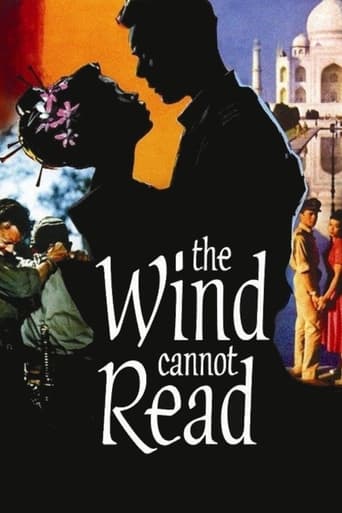malcolmgsw
This was one of the colour films made on location by Rank in the late fifties to get people back into the cinemas.With films like this such a move was bound to fail.The story is risible.Bogarde plays a decorated flying officer,who for no given reason is selected to learn Japanese.This despite having no declared linguistic skills.This school is held in Delhi,not the safest of places in 1943.He falls in love with teacher Yoko Tani who plays the role as if sleepwalkng.He is subsequently sent up to the front,when he is more likely to have been sent home.The ending is clearly aimed at the four hanky brigade.No wonder the Roxy closed after showing this.It died of shame.
clanciai
A very beautiful melodrama of tragic love set in India in some of its most enchanting places (including Taj Mahal, of course,) under the shadow of the war with Japan. Dirk starts off escaping from them in Burma and ends up their prisoner once again. Between his ordeals he experiences an ideal romance with a Japanese girl who teaches Japanese to intelligence soldiers, one of whom is Dirk. The class sequences are almost the best of the film. Charming music embellishes the film and wraps it up in bitter-sweet romance which never gets too sleazy, since there are constant complications.It's an odd film for Dirk Bogarde and a very singular war and love story, very much akin to William Holden's war and love experiences in Korea and Hongkong, but this is both more idyllic, more intimate and more personal, since Yoko Tani is a more Madame Butterfly kind of girl, more sensitive and vulnerable, and Dirk is delicate enough to treat her with care. so he doesn't make matters worse, as he did in "Simba".The film leaves you with a few question marks, though. Whatever happened to the miserable Fenwick? You can only suppose the worst. But the worst gaffe is the tremendous mistake of Brigadier Anthony Bushell not to immediately turn back when he sees an obvious booby-trap on the road, a dreadful tactical mistake, which no qualified Brigadier would have risked committing. But then without that goof, there would have been no great finale to the melodrama.The most beautiful detail of the film is the symbology, though, which doesn't become clear until afterwards. A sign says that you may not pluck cherry blossoms while they bloom, but the wind cannot read and plucks them anyway, one of those enigmatic but most appropriate Japanese philosophical adages as a motto for the whole film.
mark.waltz
Handsome Dirk Bogarde is a British officer in India preparing for war against the Japanese. He falls in love with the china-doll like Yoko Tani, a Japanese girl who left her homeland with her father in order to save his life after he rebelled against Emperor Hirohito's regime. She is the bashful teacher hired to tutor Bogarde and his colleagues in Japanese, and returns his feelings. Tani is hiding a secret illness and begs Bogarde to let her go, but he refuses. They are married but soon afterwords he goes off to battle and ends up a tortured prisoner of the Japanese. Knowing something is wrong with her, he fights desperately to be freed and get back before it is too late.This variation (and combination) of several tearjerkers seems alright when it comes to the basic storyline, but what destroys it ultimately is the painfully slow pacing and a profound disbelief over the whole situation. The innocent Tani is certainly beautiful, but is far too flower-like in her psyche, so gentle that you fear any hurt would cause all of her metaphoric peddles to fall apart. The Japanese classroom add the only humor as the British officers each ask Tani a question about Japan and she giggles very youth-like at the inquiry and some of the responses. But the pacing proves the saying that "silence is deafening" and can sometimes cause a painfully induced desperation to stay awake.
dsewizzrd-1
Dirk Bogarde is an officer during World War II learning Japanese in India in order to do intelligence work on the Indian front.While there he gets a Japanese teacher, who is full of the inscrutable and mysterious East, like a Chinese motorcycle. Some scenes are pretty fruity in between the Indian travelogue and the first scene doesn't fit into the plot properly, in fact it doesn't seem to have any relevance at all (lost in editing perhaps?). In the war scenes, the Japanese are honourable, like in "Bridge Across The River Kwai", not at all like they actually were, and the British are all very 'pukka' and respectable - it's strictly popular fare.


